The Friendly Fire Room Presents
Listen And See
Thank you Wanda Barlow for this great idea!
Genesis Framework Part 53
Genesis Framework Pt 53
Genesis Framework
GF 53 Genesis 5.28-29
September 11, 2016
Part 53
NKJ Genesis 5:28-29
28 Lamech lived 182 years, and had a son.
29 And he called his name Noah, saying, "This one will comfort us concerning our work
and the toil of our hands,
because of the ground which the LORD has cursed."
My original intent was for us to take a closer look at
the question, what was so special about Noah at the
time of his birth, that would not only inspire his father
Lamech to name him Noah, meaning “rest”, but also to
cause him to realize that his son Noah was to become
an important figure in the history of mankind, such that
he might bring “consolation” to those in his day who
would be looking for righteousness and the will of God.
In order to discover an answer to this question, I said that we would need to consult extra-biblical sources which would likely provide helpful information on the subject; which subsequently took us to the ancient, non-canonical Book of Enoch.
In the meantime, I informally answered a question that was raised, “How did Enoch learn to write in the first place?”
My brief answer was that Enoch had learned to read and
write from the angels who had runaway from heaven in
order to cohabitate promiscuously with the beautiful
daughters of men. Of course, our first reaction to that thought is to suppose
that nothing good could ever come out of the teaching
of “fallen angels”, leading us to the sensible conclusion
that, Enoch having learned how to write from these
angels should necessarily disqualify the Book of Enoch
as a useful source of information and understanding of
the Scriptures.
This issue gave me sufficient dissonance to prompt a
change in my teaching plan, in order to address this
log-jam concern, first. So, today’s message, and possibly next week’s, will be
dedicated to responding with a formal answer to the
question from last week, of how Enoch learned to read
and to write, and the results of it; in addition, we will
examine every statement in the Book of Enoch that
specifically makes use of the terms: reading, the art
of writing, the work of the scribe, books, tablets, records, letters, and notes.
This process will obviously take some time, but it will have been worth it, because it should provide a wonderful opportunity for an introduction into the amazing Book of Enoch.
From the outset, we must constantly remind ourselves that this book is not included in the Protestant Bible; Jesus and the apostles never called it Scripture; even though many early church fathers highly valued the Book of Enoch, they never referred to it as Scripture; therefore, we cannot view it as authoritative since, regardless of our personal opinion about it, we do not consider it to actually be the inspired Word of God.
Editor:
“I believe the text to be in good condition generally.
It seems to be almost complete, with a beginning and an
end, and it is self-consistent. Even more significant is
the way that Enoch's character and style of writing are
still apparent. The only parts that I suspect were written
by different authors I have separated out, as the Book of
Methuselah, and the Book of Noah, (Chapters 10 & 11).”
Enoch had two main reasons for writing his book.
The first was because the Watchers (angels) in heaven instructed him to do it (explanation forthcoming).
The second reason; was to save his family from the Flood of judgment.
Editor:
“The standard academic view seems to be that some
slightly demented religious fanatic wrote the book - not
long before the earliest provable fragments, (200 or
300BC). I think it is impossible to support this view.”
Editor:
“Such an author would have to be able to write the entire
book from the point of view of a person who knows
nothing of countries with names, or religions with names.
Then he goes on to describe the Angels as blond men,
who ran away from Heaven in order to be promiscuous
with women. I don’t believe this is the sort of world view
that would have been well received or widely accepted
anywhere in 200 BC.”
“This plus the all too accurate prophecies are probably the reasons why it was ‘lost’ by the religions that used to regard it as holy.”
The first half of Enoch is mainly the story of what occurred, whereas the second part is mainly written from the notes that Enoch took while he was with the Watchers in heaven.
(3) Rebels Among the Watchers (Enoch 6.1 – 9.11)
This is the story of the runaway angels. Interestingly, the beginning (6.1-2), is virtually identical with Genesis 6.1-2; however, in Enoch's book, we get names and many other details...
Enoch
6.1 And it came to pass,
when the sons of men had increased,
that in those days there were born to them fair and
beautiful daughters.
6.2 And the Angels, the sons of Heaven, saw them and desired them. And they said to one another: "Come, let us choose for ourselves wives, from the children of men, and let us beget, for ourselves, children."
NKJ Genesis 6:1-2
1 Now it came to pass,
when men began to multiply on the face of the earth,
and daughters were born to them,
2 that the sons of God saw the daughters of men, that they were beautiful; and they took wives for themselves of all whom they chose.
Enoch
6.3 And Semyaza, who was their leader, said to them: "I fear that you may not wish this deed to be done and
that I alone will pay for this great sin."
6.4 And they all answered him, and said: "Let us all swear an oath, and bind one-another with curses, so not to alter this plan, but to carry out this plan effectively."
6.5 Then they all swore together and all bound one another with curses to it.
Enoch
6.6 And they were, in all, two hundred and they came
down on Ardis, which is the summit of Mount Hermon.
And they called the mountain Hermon because on it they
swore and bound one another with curses.
Here, Enoch explains the naming of Mount Hermon– the Hebrew meaning in this context means ‘curses’.
Otherwise, it means “sanctuary.”
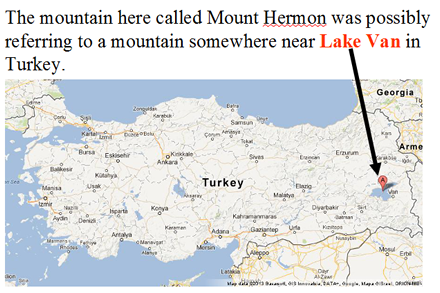
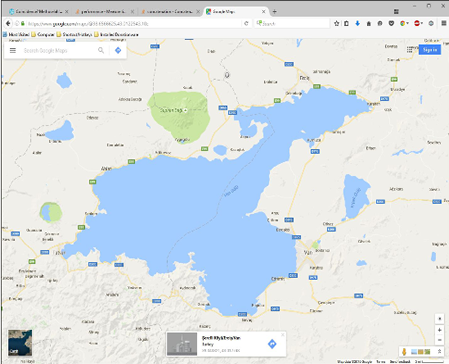
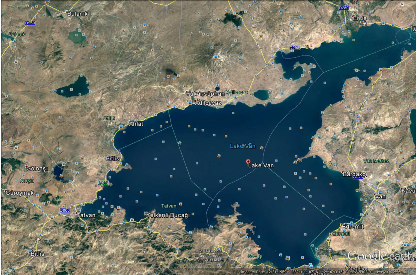
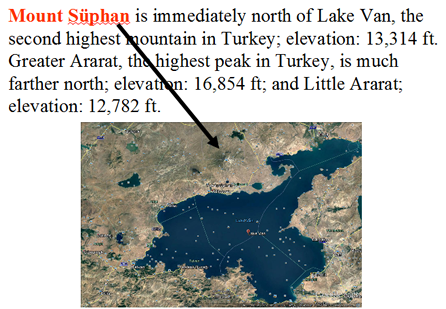
It is common for translators to update names rather than use phonetics, so the few names that appear, mainly mountains and rivers, can’t be relied upon as accurate identifications; especially since the Flood changed the topography of the earth to a great extent.
We don’t know whether there was another mountain called ‘curses’ or even what language the book was originally written in.
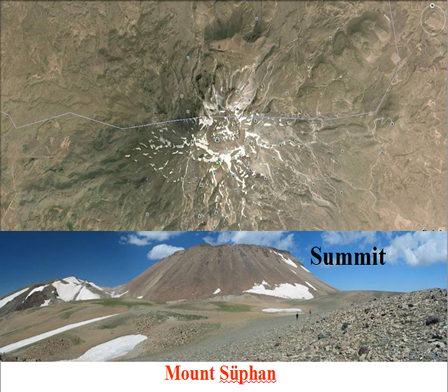
(4) The Most High of the Watchers Speaks Out (Enoch 10.1 - 11.2)
This chapter is basically where Enoch presents us with a condemnation of the runaways by the Most High of the Watchers. This gives us an idea of how the runaways were regarded at that time, in heaven, their original home.
Not until later in the book are we to discover more background details; namely, at 106.13 (chapter 10), where we learn that the runaways came to Enoch's area in his father Jared’s day.
For what it may be worth, an interesting distinction needs to be made between what the Scriptures refer to as “fallen angels’; those who were kicked out from heaven because of their unholy behavior, and the so called “runaway angels”; those who conspired among themselves to leave heaven of their own volition in order to pursue unholy behavior.
At 10.1-3 of Chapter (4), the Most High instructs an angel to save the son of Lamech (this will be Noah) from the flood.
This is interesting, because besides prophesying details of the flood, and its timing, it reveals that this was written at a time when Enoch is a grandfather, (of Lamech), but he does not yet know what Lamech's son will be called, but that he will be born.
If the runaways were young in Enoch's father Jared’s day, then they are probably at least 10 years older than Enoch and maybe more. So, it is likely that the events in this book happen at a time when the runaways are quite old.
The majority of this chapter consists of a prophecy of
doom for the runaways, and here is where it becomes
obvious that heaven does not condemn Enoch for having
acquired the knowledge and ability to read and write;
instead, his skills are proven to be useful and beneficial
in accomplishing the divine purposes of God.
Enoch is referred to as a scribe, and he says that it was the angels (the runaway Watchers), who introduced mankind to writing.
Enoch was probably taught to write, and employed by the runaway angels after they came to Enoch's area in his father Jared’s day.
If we condemn Enoch for having learned to read and write from angels who had run away from heaven to lust after beautiful women and to beget children from them, we might also have to condemn Moses for having learned such skills from within the house of the Pharaoh of Egypt, who was literally worshipped as a god, not only did the Egyptians believe that he ensured the annual flooding of the Nile that was necessary for their crops, but that he was the divine agent on earth who worked to maintain the stability of the cycles of the entire universe!
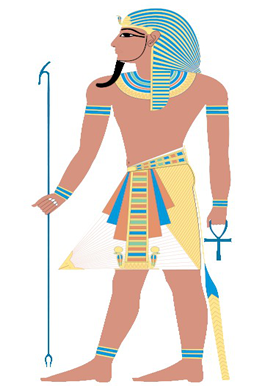
(5) Enoch Meets the Holy Watchers (Enoch 12.1-13.10)
12.3 And I Enoch, was blessing the Great Lord and the King of Eternity. And behold, the Watchers (in heaven) called to me - Enoch the scribe - and said to me:
12.4 "Enoch, scribe of righteousness. Go and inform the
Watchers of Heaven, who have left the High Heaven and
the Holy Eternal Place, and have corrupted themselves
with women, and have done as the sons of men do and
have taken wives for themselves, and have become
completely corrupt on the earth.
Enoch explains how the runaways decided to send a letter, (13.4-–6), begging God’s forgiveness, and Enoch is given the task of writing and delivering this letter.
13.3 And then I went and spoke to them all (the 200 Watchers who left heaven) together, and they were all afraid; fear and trembling seized them.
13.4 And they asked me to write out for them the record of a petition, so that they might receive forgiveness, and
to take a record of their petition up to the Lord in Heaven.
(6) The Book of Reproof (Enoch 14.1-16.4)
14.4 And I wrote out your petition, but in my vision, thus it appeared, that your petition would not be granted to you, for all the days of eternity; and complete judgment has been decreed against you, and you will not have peace.
14.7 And your petition will not be granted in respect of them (their offspring of giants, Nephilim) or in respect of yourselves. And while you weep and supplicate you do not speak a single word from the writings which I have written.
(9) The Fragrant Trees (Enoch 24.1-36.4)
At 33.3-4, Enoch mentions how Uriel gave him notes on astronomy. These notes are later in this book as Chapters 13, 14, and 16.
Who is Uriel?
Uriel (God is my light) is one of the archangels spoken of by post-Exilic Rabbinic tradition, and also of certain Christian traditions.
Here Uriel is responsible for warning Noah about the upcoming Great Flood…
33.3 And I saw how the stars of Heaven come out, and counted the Gates out of which they come, and wrote down all their outlets, for each one, individually, according to their number. And their names, according to their constellations, their positions, their times, and their months, as the Angel Uriel, who was with me, showed me.
33.4 And he showed me everything, and wrote it down, and also their names he wrote down for me, and their laws and their functions.
(12) The Book of Parables (Enoch 37.1- 37.5)
The First Parable (Enoch 38.1- 4.1)
39.2 In those days Enoch received books of indignation and anger and books of tumult and confusion. And there will be no mercy for them, says the Lord of Spirits.
39.3 And at that time clouds and a storm wind carried me off from the face of the earth and set me down at the end of Heaven.
39.4 And there I saw another vision; the Dwelling of the Righteous and the Resting-Places of the Holy.
40.8 And after this I asked the Angel of Peace, who went with me, and showed me everything which is secret: "Who are those four figures, whom I have seen, and whose words I have heard and written down?"
The Second Parable (Enoch 38.1- 4.1).
47.3 And in those days, I saw the Head of Days sit down on the Throne of his Glory and the Books of the Living were opened in front of him and all His Host, which dwell in the Heavens above, and his Council were standing in front of Him.
47.4 And the hearts of the Holy Ones were full of joy that the number of righteousness had been reached, and the prayer of the righteous had been heard, and the blood of the righteous had not been required in front of the Lord of Spirits
The number of righteousness referred to here, that is
reached, may refer to the 12 times 12,000 (144,000)
predicted to be sealed in the biblical Book of Revelation.56.5 And in those days, the Angels will gather together,
and will throw themselves towards the east, upon the
Parthians and Medes. They will stir up the kings so
that a disturbing spirit will come upon them, and they
will drive them from their thrones; and they will come
out like lions from their lairs, and like hungry wolves in
the middle of their flocks.
This is a rare mentioning of place names - Parthia and Medes; namely, the ancient kingdoms in the Iran\Iraq area.
This is probably the area where Enoch lived, but it is difficult to know whether he originally used these names in his book, or whether later translators substituted in their own names for the areas that they thought were being referred to.
The Third Parable (Enoch 58.1- 69.29)
At 60.1 Enoch gives his age; it is written as 50.
69.8 And the name of the fourth is Penemue; this one showed the sons of men the bitter and the sweet and showed them all the secrets of their wisdom.
69.9 He taught men the art of writing with ink and paper, and through this many have gone astray, from eternity to eternity, and to this day.
69.10 For men were not created for this, that they should confirm their faith like this, with pen and ink.
69.11 For men were created no differently from the
Angels, so that they might remain righteous and pure,
and death, which destroys everything, would not have
touched them; but through this knowledge of theirs they
are being destroyed and through this power death
consumes them.
(11) The Book of Noah (Enoch 65.1 – 68.1)
Noah's book was probably written by Noah when he was the head of the family and like Methuselah he claims to speak with Enoch. He seems to have written this before the flood; and once again there are some interesting details.
The most important passage is at 67.2, which indicates that the boat is being constructed at the time of writing.
Noah may have written this piece in order to persuade his sons to come and live with him, inside "the wooden structure;” perhaps having not seen a boat like this before, Noah was not sure what to call it.
65.1 And in those days, Noah saw the Earth had tilted and that its destruction was near.
65.2 And he set off from there and went to the ends of the Earth and cried out to his great-grandfather Enoch; and Noah said three times in a bitter voice: "Hear me, hear me, hear me!"
65.3 And he said to him: "Tell me, what is it that is being done on the Earth, that the Earth is so afflicted and shaken, lest I be destroyed with it!"
65.4 And immediately there was a great disturbance on the Earth and a voice was heard from Heaven and I fell upon my face.
65.5 And my great-grandfather Enoch came, stood by me, and said to me…
68.1 And after this, my great-grandfather Enoch gave me the explanation of all the secrets, in a book, and the parables that had been given to him; and he put them together for me, in the words of the Book of Parables.
The Revolutions of the Lights (Enoch 72.1- 81.4)
74.2 And Uriel, the Holy Angel who is leader of them all, showed me everything, and I wrote down their positions as he showed them to me. And I wrote down their months, as they are, and the appearance of their light, until fifteen days have been completed.
80.1 And in those days Uriel answered me and said to
me: “Behold, I have shown you everything, Oh Enoch.
And I have revealed everything to you, so that you may
see this Sun, and this Moon, and those who lead the
Stars of Heaven, and all those who turn them, their tasks
and their times and their rising.
Within this chapter we find a description of a book written by the Watchers from which Enoch took notes (81.1-2), Enoch calls it The Tablets of Heaven.
Enoch’s prophecy chapters (second-half of the book) come from this book.
81.1 And he said to me: “Oh Enoch, look at the book of the Tablets of Heaven and read what is written upon them, and note every individual fact.”
81.2 And I looked at everything that was written and I noted everything. And I read the book and everything that was written in it, all the deeds of men, and all the children of flesh who will be upon the Earth, for all the generations of eternity.
81.3 And then I immediately blessed the Lord, the Eternal King of Glory, in that he has made all the works of the world, and I praised the Lord because of his patience, and I blessed him on account of the sons of Adam.
81.4 And at that time I said: “Blessed is the man who dies righteous and good, concerning whom no book of iniquity has been written, and against whom no guilt has been found.”
Amen
Many will be surprised on the Day of Judgment when they discover that it was just as the Word of God says; only the righteousness of Christ is able to save you.All men are sinners and no one can save himself. God is just, so He must punish sin; but He is also merciful, moreover gracious, and offers His Son as the perfect sacrifice in order to purchase a place for you in heaven, which He offers to you as the free gift of eternal life. As we continue to examine man’s earliest duties with regard to the covenant of works, although they can be categorically divided into two distinct types of classes; one in relationship with God, and the other in relationship with fellow man, all covenant stipulations are expressions of the will of the Lord. The law of the covenant is the law of man’s image-sonship.
Jesus is God Incarnate
In order to pay the debt of our sins, He came from Heaven, having been sent by the Father, where He lived a life of perfect obedience to the Father even unto the shameful death upon the cross in order to pay the debt of your sins.This gift must be received by faith, believing that Jesus’ perfect life and Cross Work was His complete and necessary Atonement for your sins, in your behalf.Faith is a gift that comes by the Power of God the Holy Spirit working in a person’s innermost being. The Holy Spirit has the authority and power to quicken your dead spirit, to make it come to life. If you have not done so before this moment, ask Jesus to forgive you your sins, tell Him you’ve stop trying to be your own savior, and ask Him to come into your life right now, and to give you eternal life. Then, in faith believing, thank Him for the gift that He is giving you, the one He paid for in full in your place, in Jesus’ name,AMEN
Copyright September, 2016
Rev. Jim Craig
All Rights Reserved